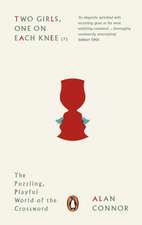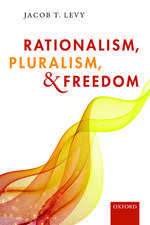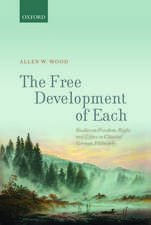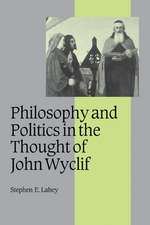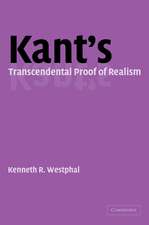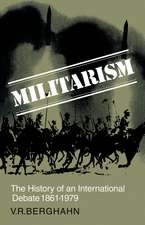Orientalism and Islam: European Thinkers on Oriental Despotism in the Middle East and India
Autor Michael Curtisen Limba Engleză Paperback – 7 iun 2009
| Toate formatele și edițiile | Preț | Express |
|---|---|---|
| Paperback (1) | 252.59 lei 6-8 săpt. | |
| Cambridge University Press – 7 iun 2009 | 252.59 lei 6-8 săpt. | |
| Hardback (1) | 482.50 lei 6-8 săpt. | |
| Cambridge University Press – 7 iun 2009 | 482.50 lei 6-8 săpt. |
Preț: 252.59 lei
Nou
Puncte Express: 379
Preț estimativ în valută:
48.33€ • 50.46$ • 40.00£
48.33€ • 50.46$ • 40.00£
Carte tipărită la comandă
Livrare economică 04-18 aprilie
Preluare comenzi: 021 569.72.76
Specificații
ISBN-13: 9780521749619
ISBN-10: 0521749611
Pagini: 392
Dimensiuni: 155 x 234 x 22 mm
Greutate: 0.49 kg
Editura: Cambridge University Press
Colecția Cambridge University Press
Locul publicării:New York, United States
ISBN-10: 0521749611
Pagini: 392
Dimensiuni: 155 x 234 x 22 mm
Greutate: 0.49 kg
Editura: Cambridge University Press
Colecția Cambridge University Press
Locul publicării:New York, United States
Cuprins
1. European views of Islam and their correlation with Oriental despotism; 2. Observant travelers; 3. Political thinkers and the orient; 4. The Oriental despotic university of Montesquieu; 5. Edmund Burke and despotism in India; 6. Alexis de Tocqueville and colonization; 7. James Mill and John Stuart Mill: despotism in India; 8. Karl Marx: the Asiatic mode of production and Oriental despotism; 9. Max Weber: patrimonialism as a political type; 10. Conclusion.
Recenzii
'Michael Curtis has written a discerning, authoritative book of intellectual history. He takes us back to the greats - Burke and Mill and Marx and Tocqueville and Weber - and throws a floodlight on the present. He has read widely and thoughtfully. From his pages, and from the company of those intellectual giants, we return with a new understanding of the civilizational conflicts that mark our contemporary world. This is a book of deep scholarship and learning, but it is written with ease and grace. A book of political theory, and of history as well. An essential book, for it retrieves for us a big piece of Western intellectual history and thought.' Fouad Ajami, Johns Hopkins University
'This erudite study reveals the nature of oriental despotism through six major Western thinkers, showing a profound knowledge of these major intellectual figures. Michael Curtis draws on a large variety of sources, providing an analysis of their work that is very scholarly indeed. His surprising conclusion is that more often than not the West was the victim of Islamic aggression from the seventh century onwards, and it was not until the nineteenth century that the West became imperialist in its contacts with the Orient. This very important book illuminates the background of the present struggle between the West and militant Islam and should definitely attract the attention of the modern reader. I recommend this book in the strongest possible terms because it is both original and timely.' Marius Deeb, Johns Hopkins University
'Michael Curtis has written an erudite and perspicacious volume … [he] has given the reader still another exploration into the human condition, and most notable into the revival of true-believer movements that fashion their instruments of discourse not from technological and scientific progress, but from the spiritual underpinnings of ancient and often obscurantist belief systems.' The Review of Politics
'… provides clear evidence of the persistence and deep-rootedness of the Orient in both the foreground and background of the European mind.' A. N. Isstaif, Journal of Islamic Studies
'This erudite study reveals the nature of oriental despotism through six major Western thinkers, showing a profound knowledge of these major intellectual figures. Michael Curtis draws on a large variety of sources, providing an analysis of their work that is very scholarly indeed. His surprising conclusion is that more often than not the West was the victim of Islamic aggression from the seventh century onwards, and it was not until the nineteenth century that the West became imperialist in its contacts with the Orient. This very important book illuminates the background of the present struggle between the West and militant Islam and should definitely attract the attention of the modern reader. I recommend this book in the strongest possible terms because it is both original and timely.' Marius Deeb, Johns Hopkins University
'Michael Curtis has written an erudite and perspicacious volume … [he] has given the reader still another exploration into the human condition, and most notable into the revival of true-believer movements that fashion their instruments of discourse not from technological and scientific progress, but from the spiritual underpinnings of ancient and often obscurantist belief systems.' The Review of Politics
'… provides clear evidence of the persistence and deep-rootedness of the Orient in both the foreground and background of the European mind.' A. N. Isstaif, Journal of Islamic Studies
Notă biografică
Descriere
Through an historical analysis of the theme of Oriental despotism, Curtis reveals the complex positive and negative interaction between Europe and the Orient.


